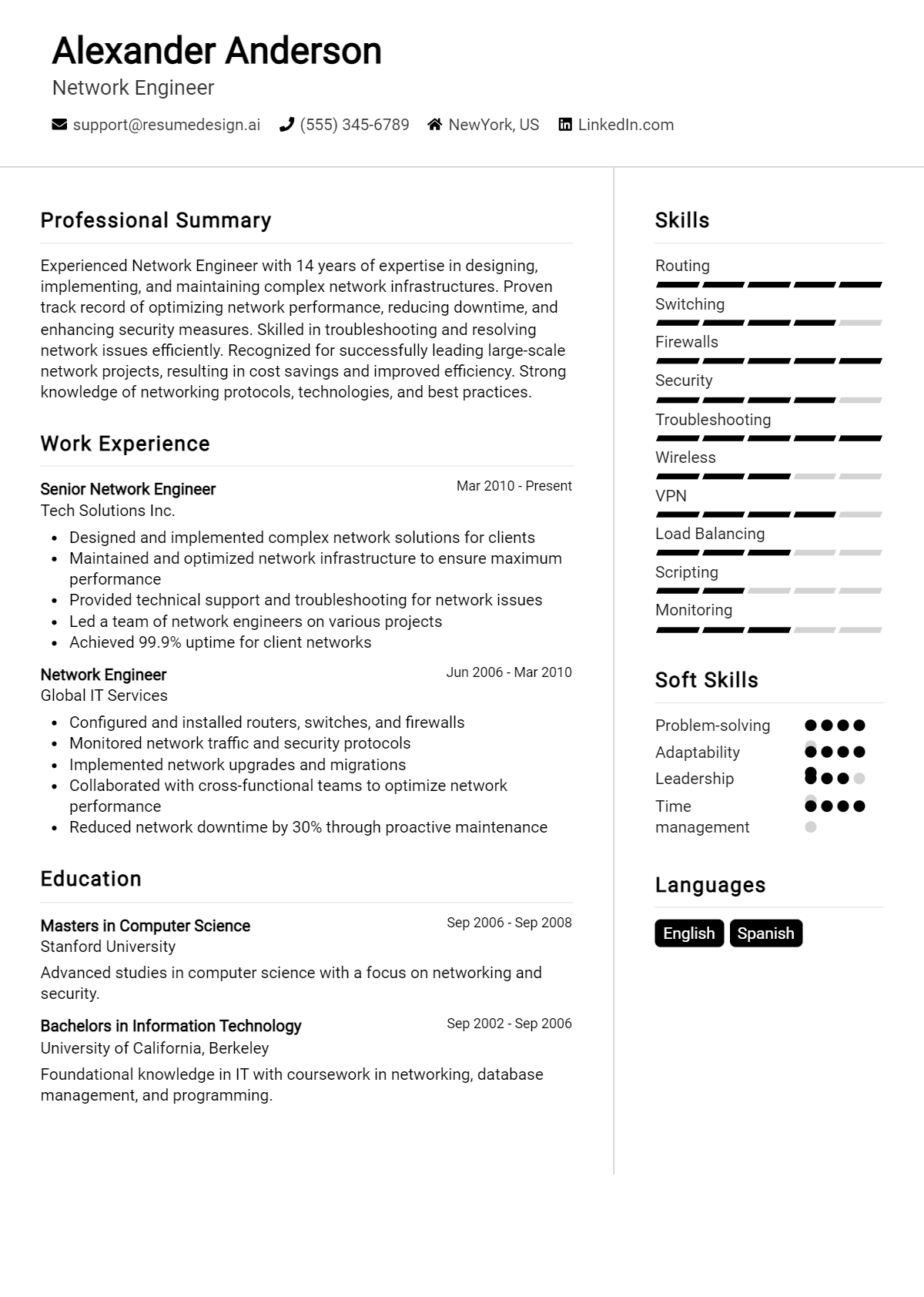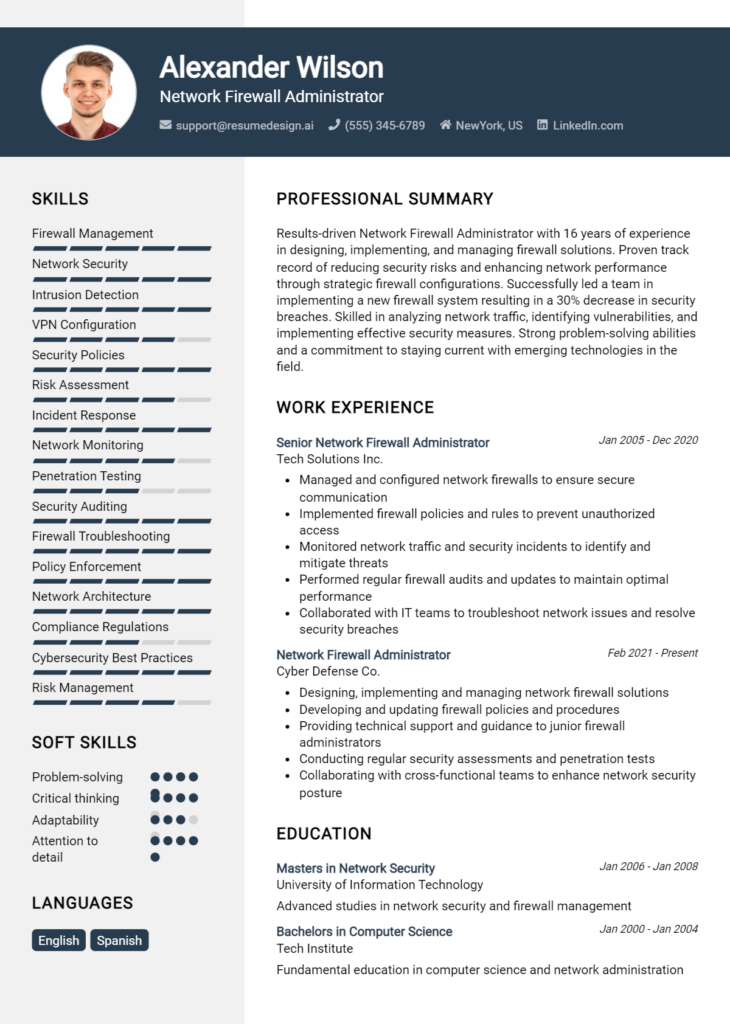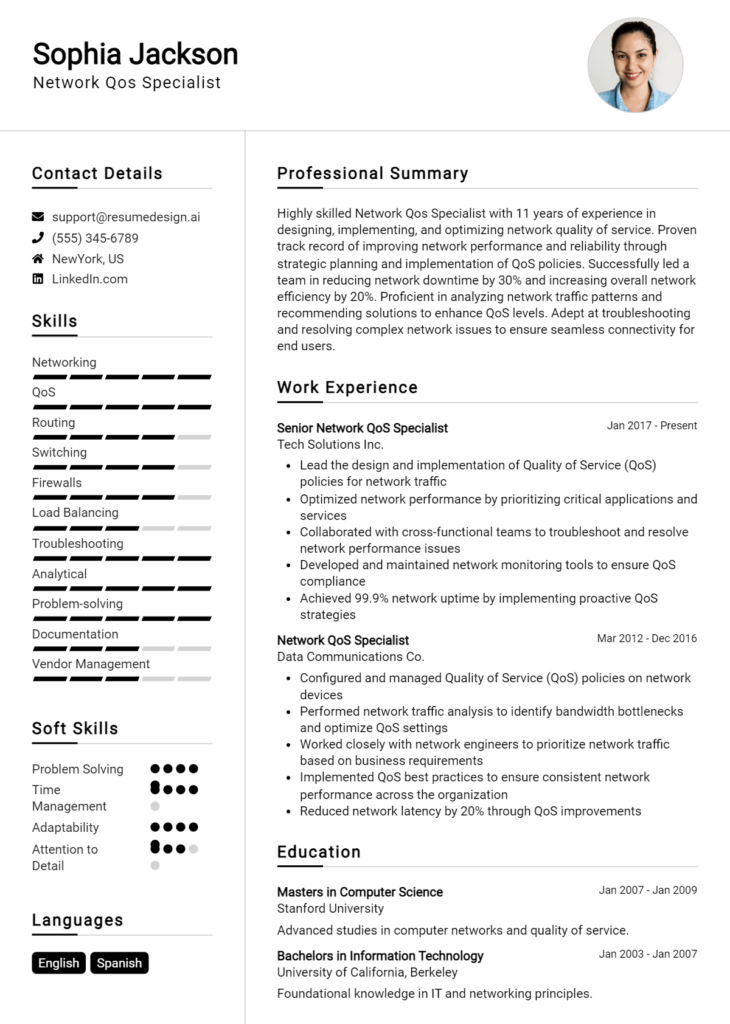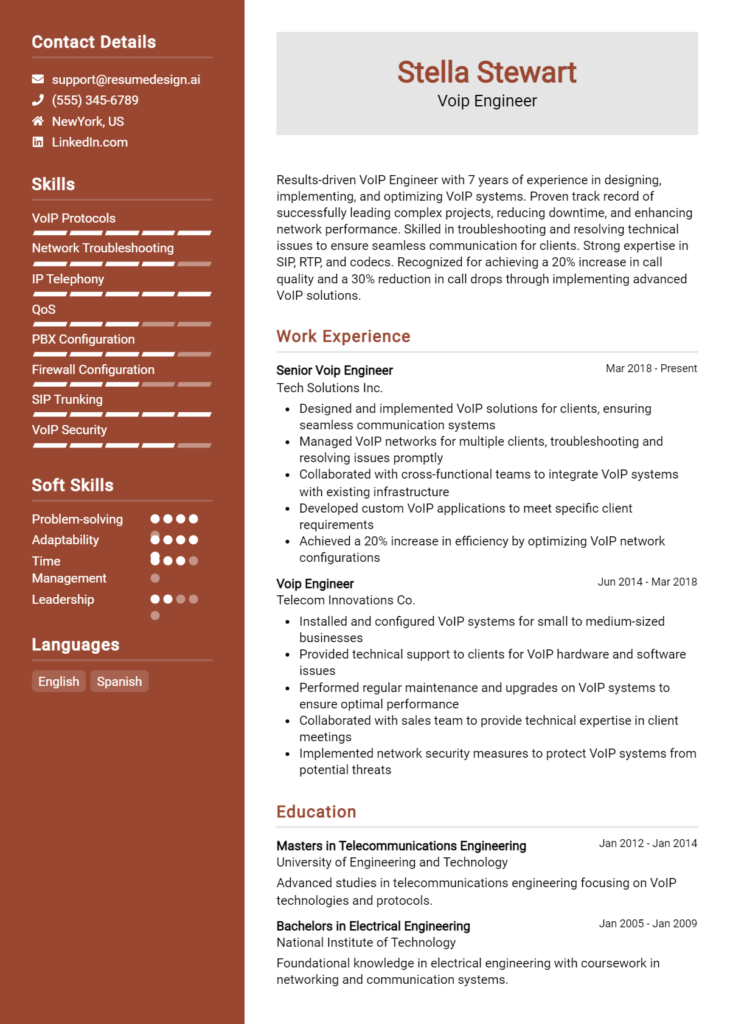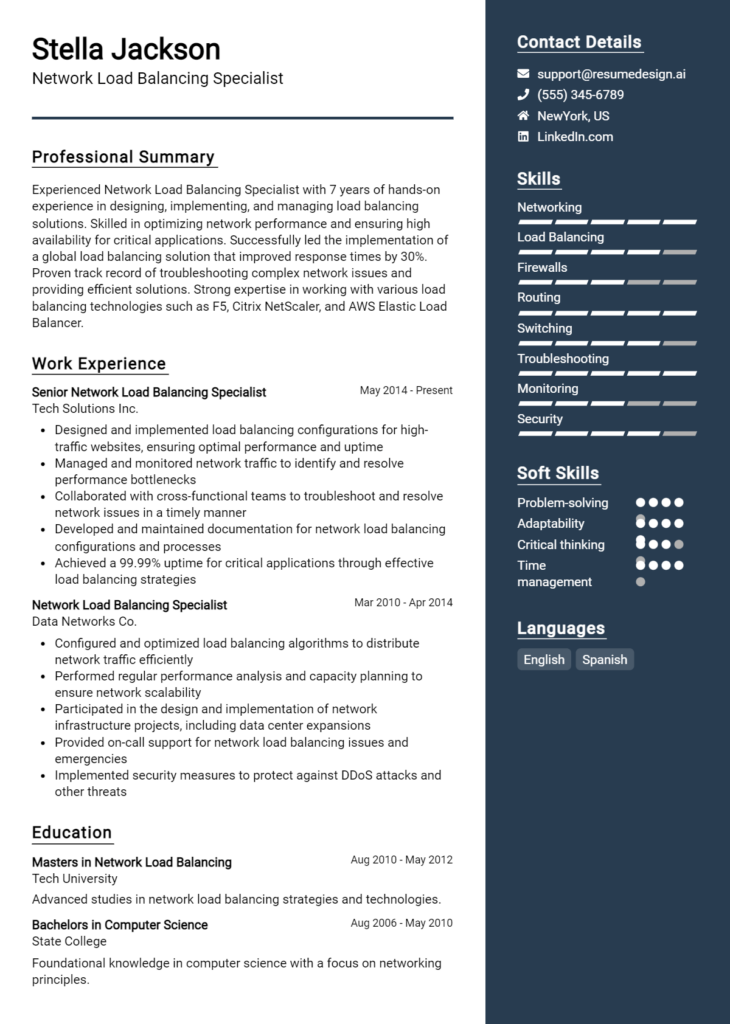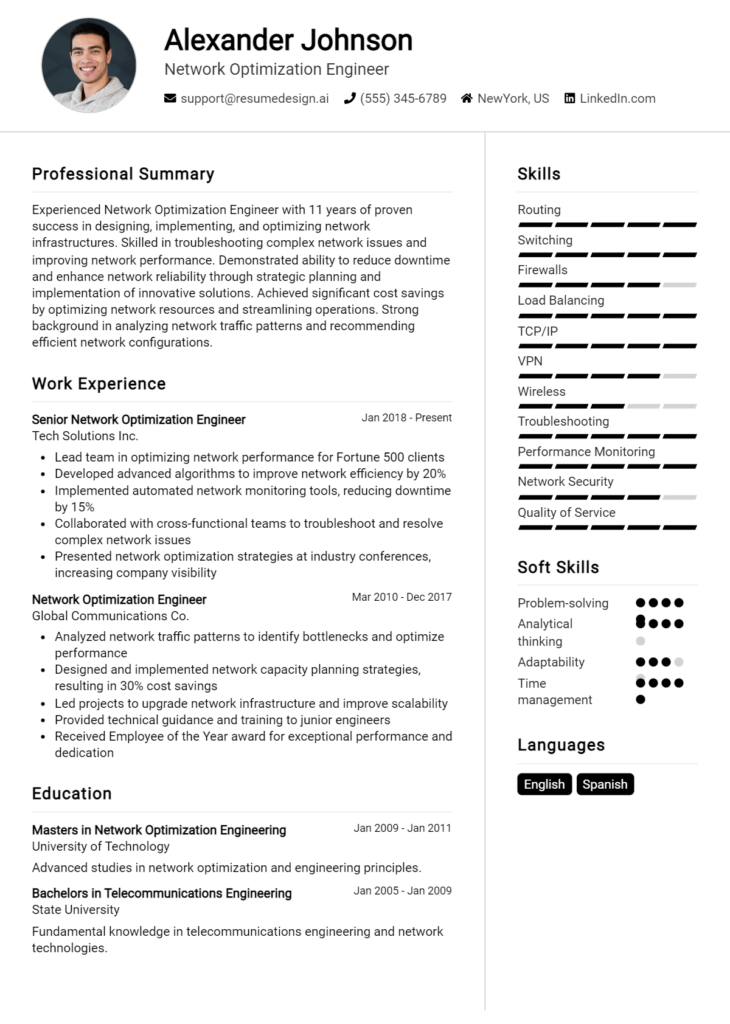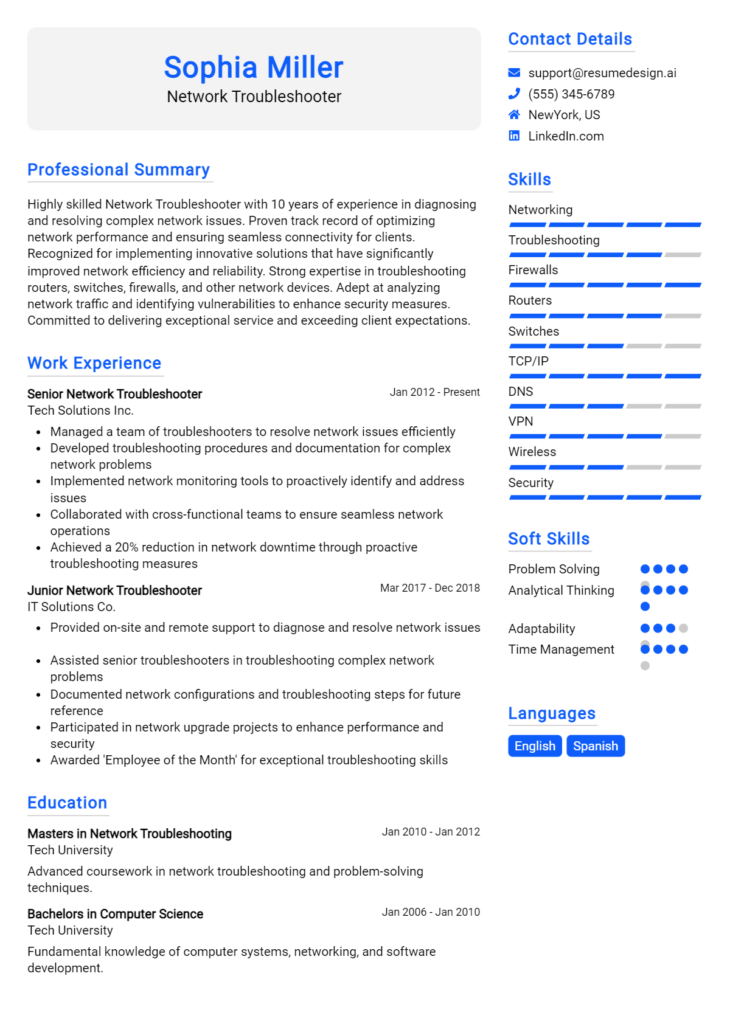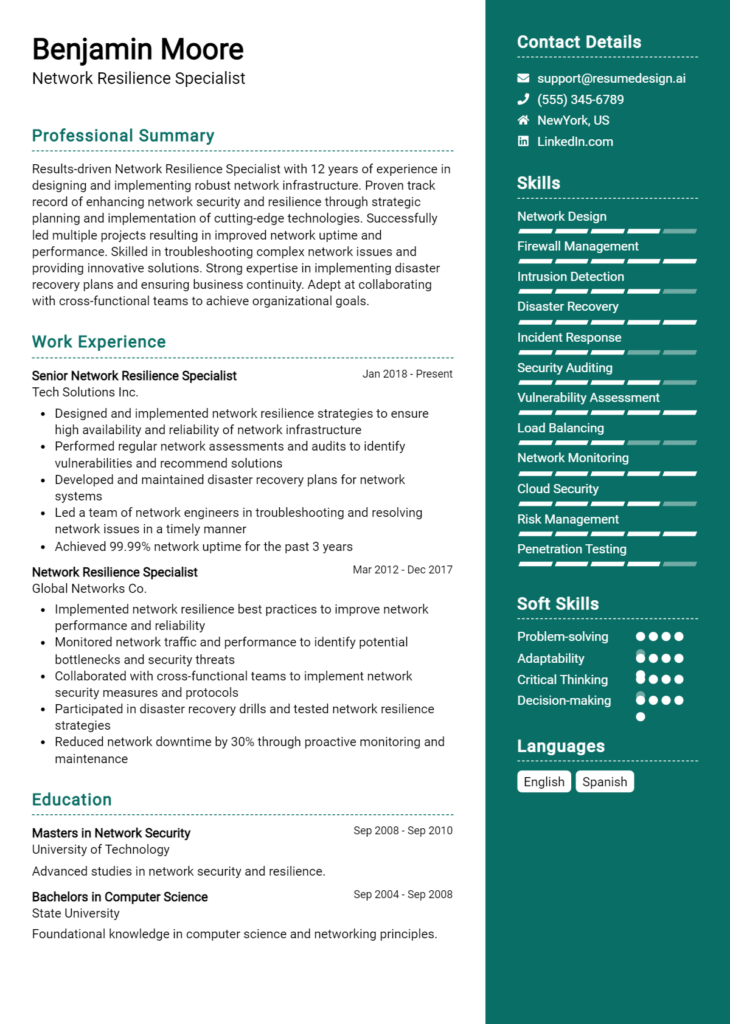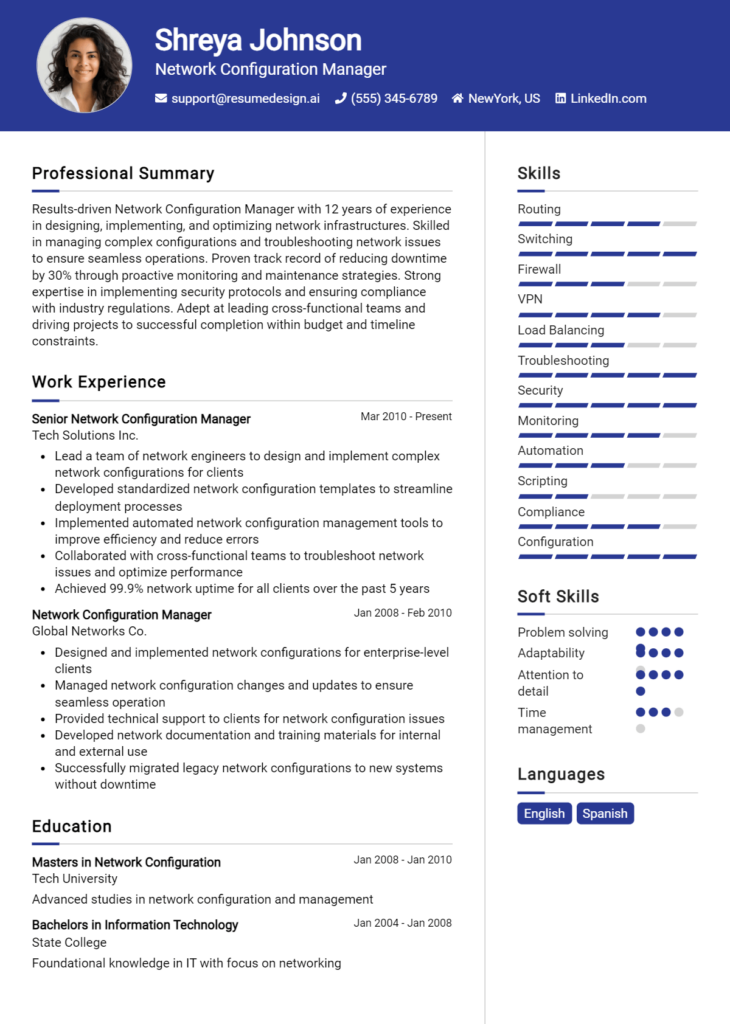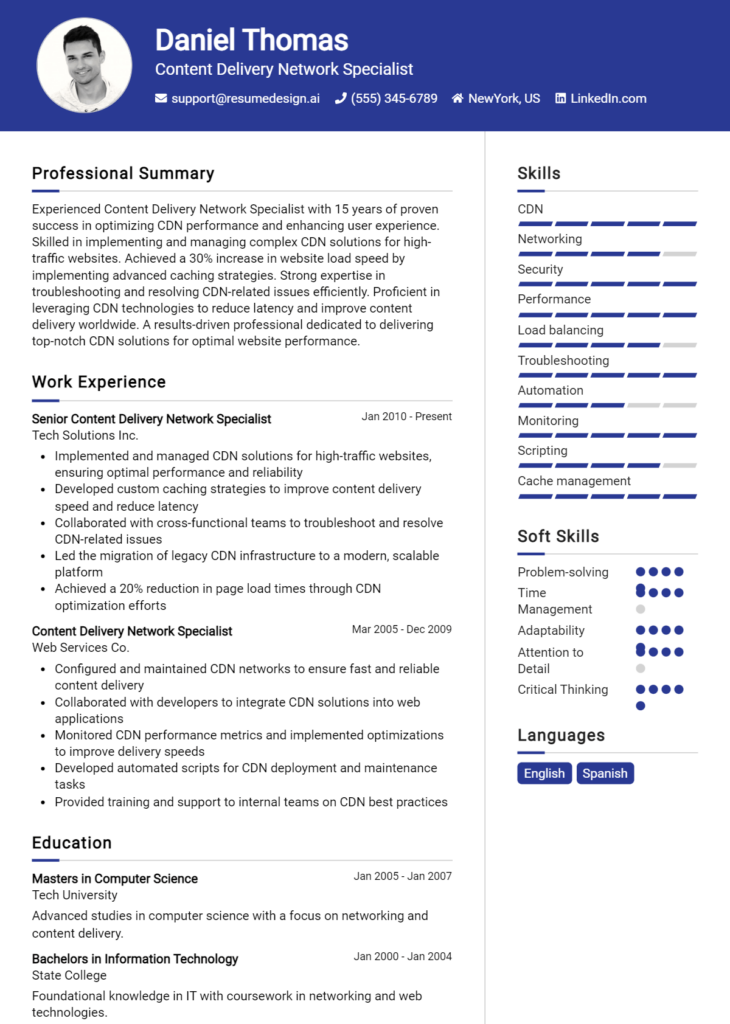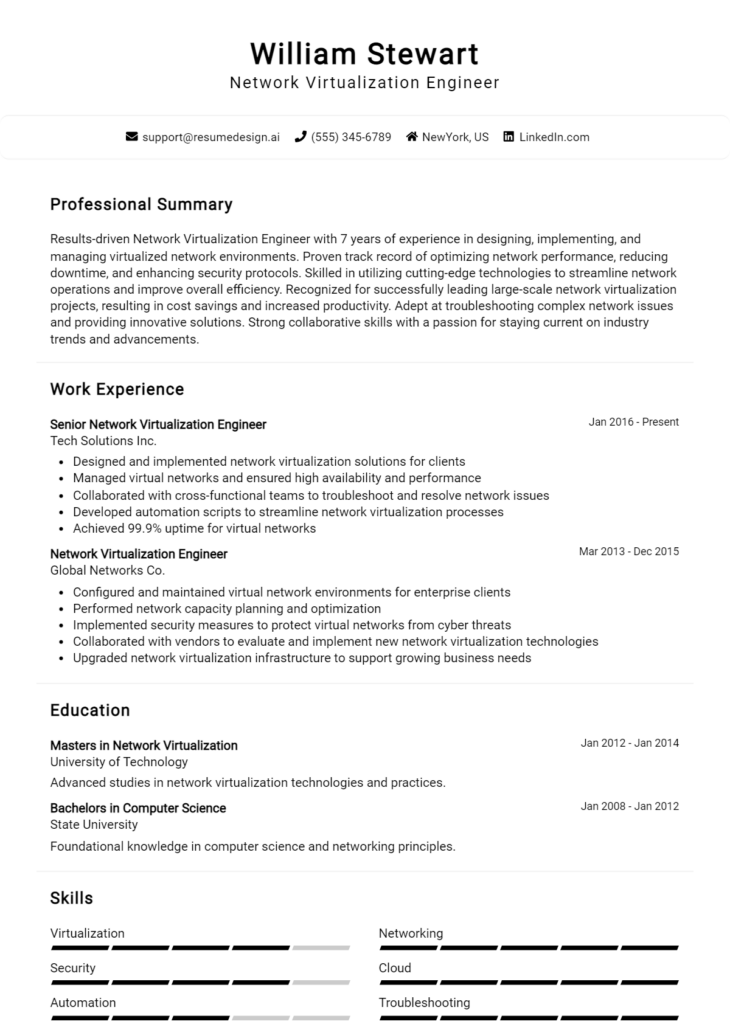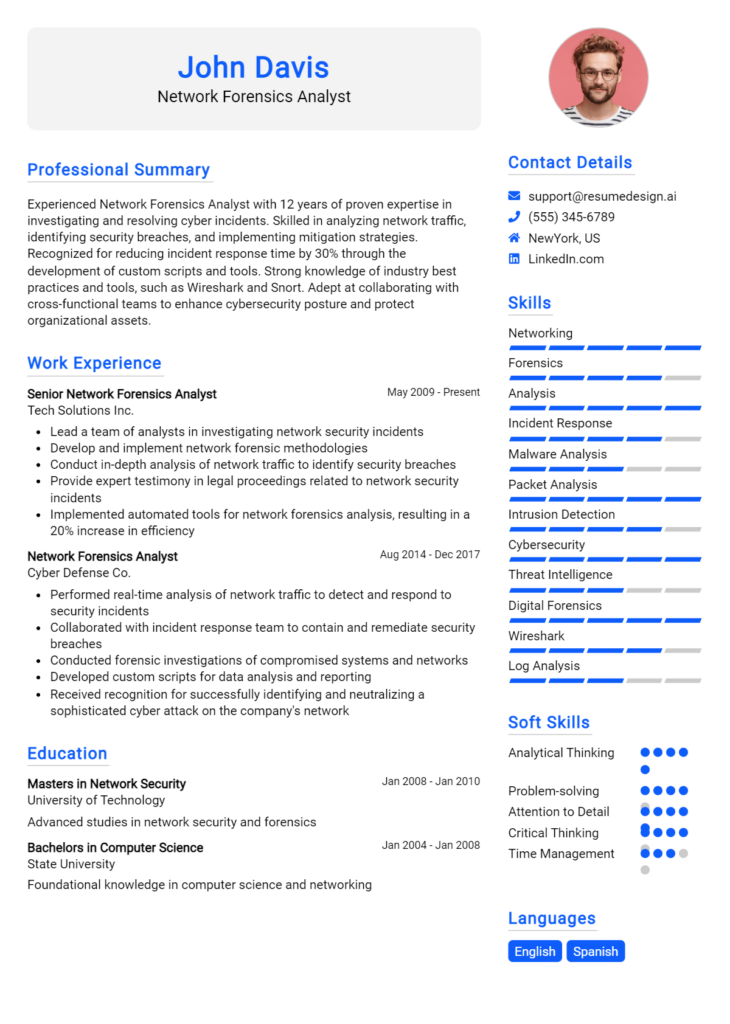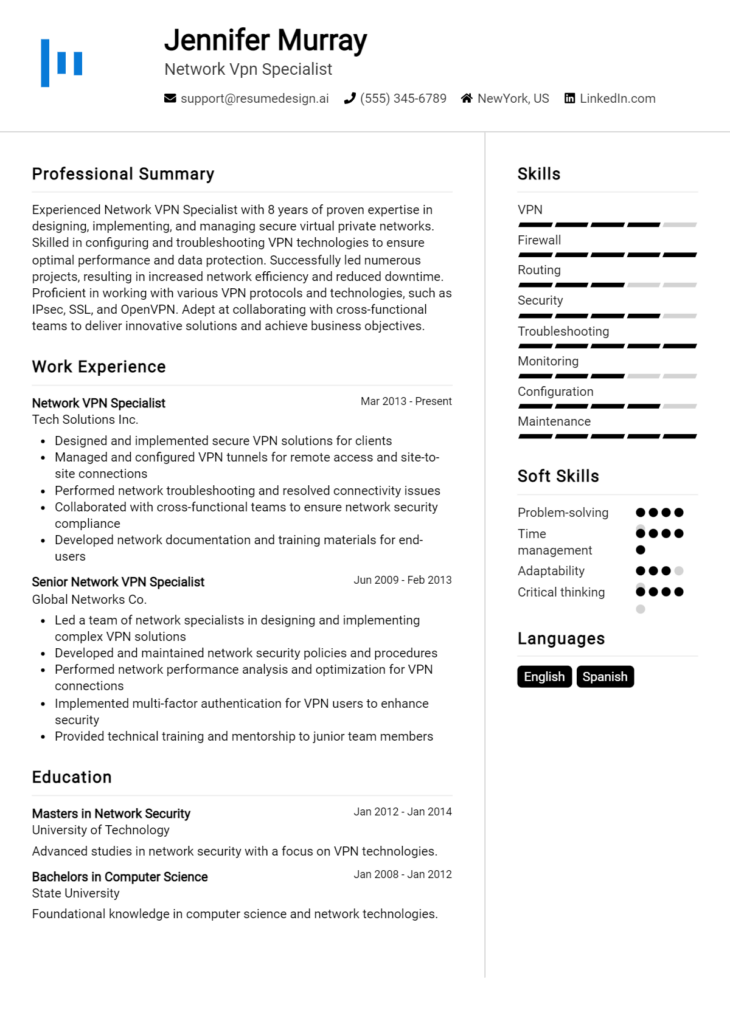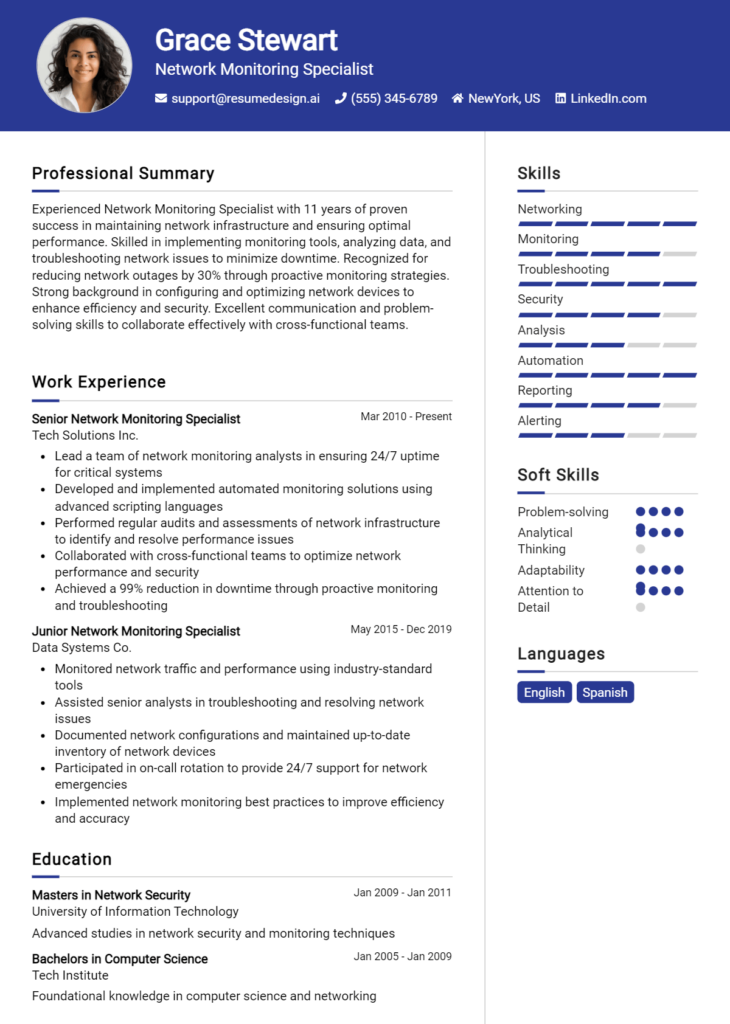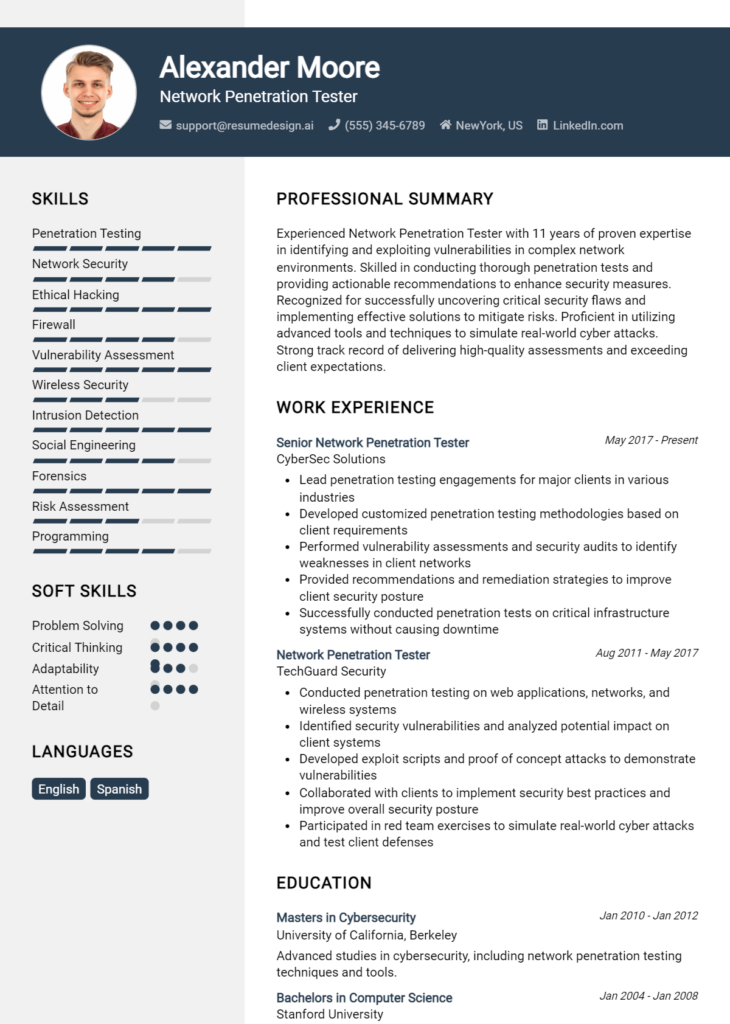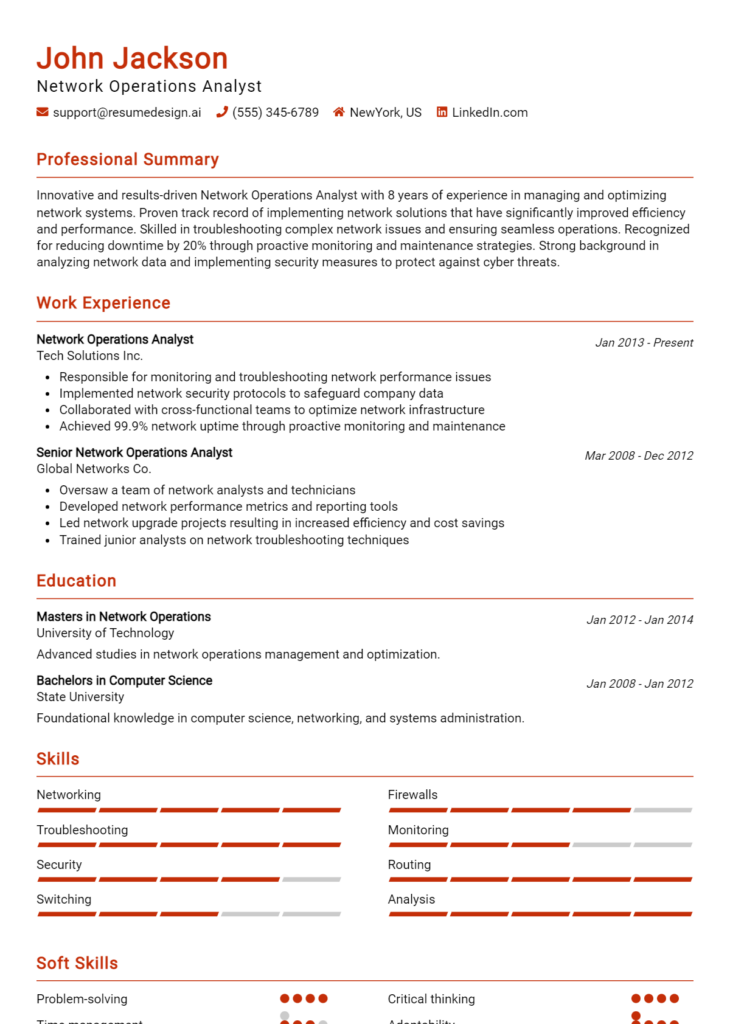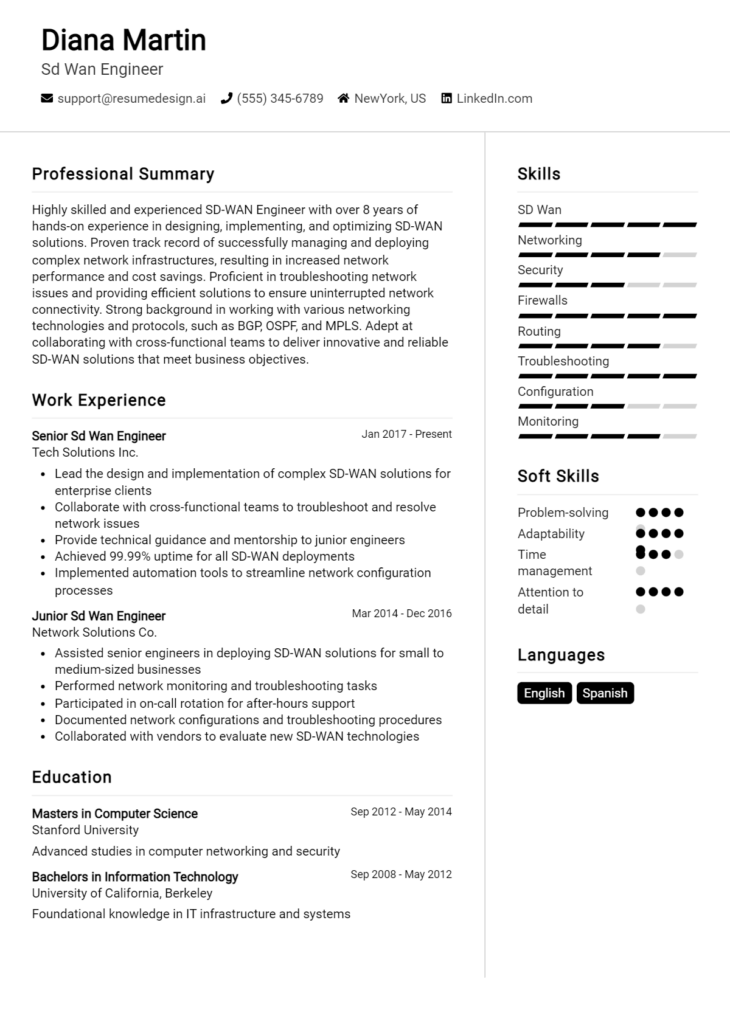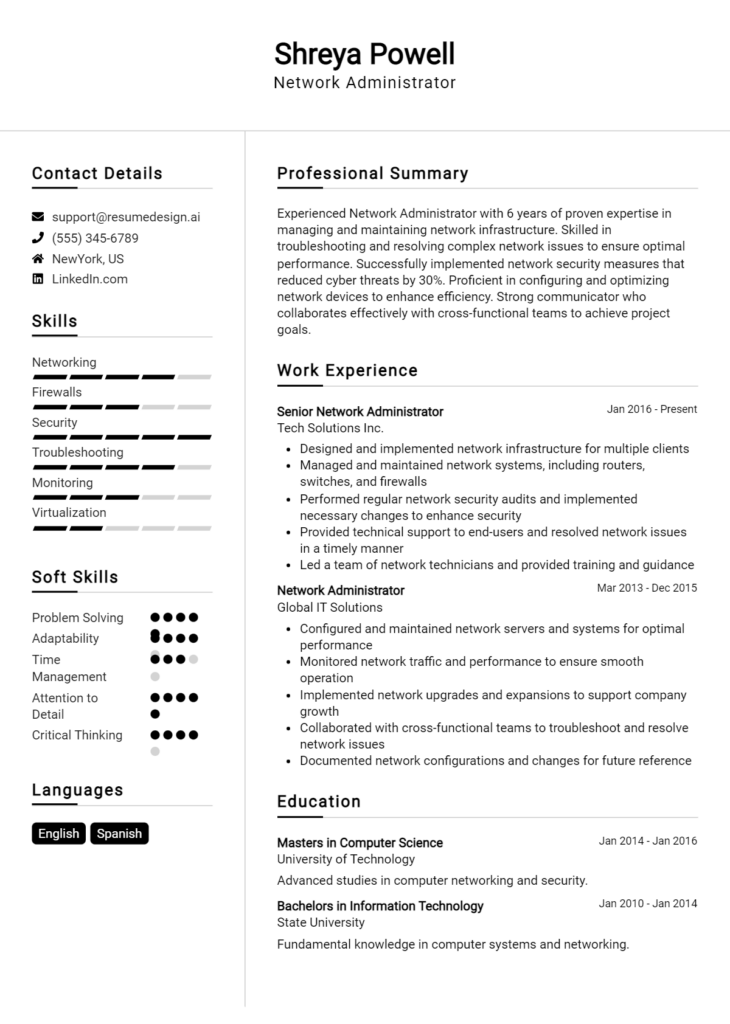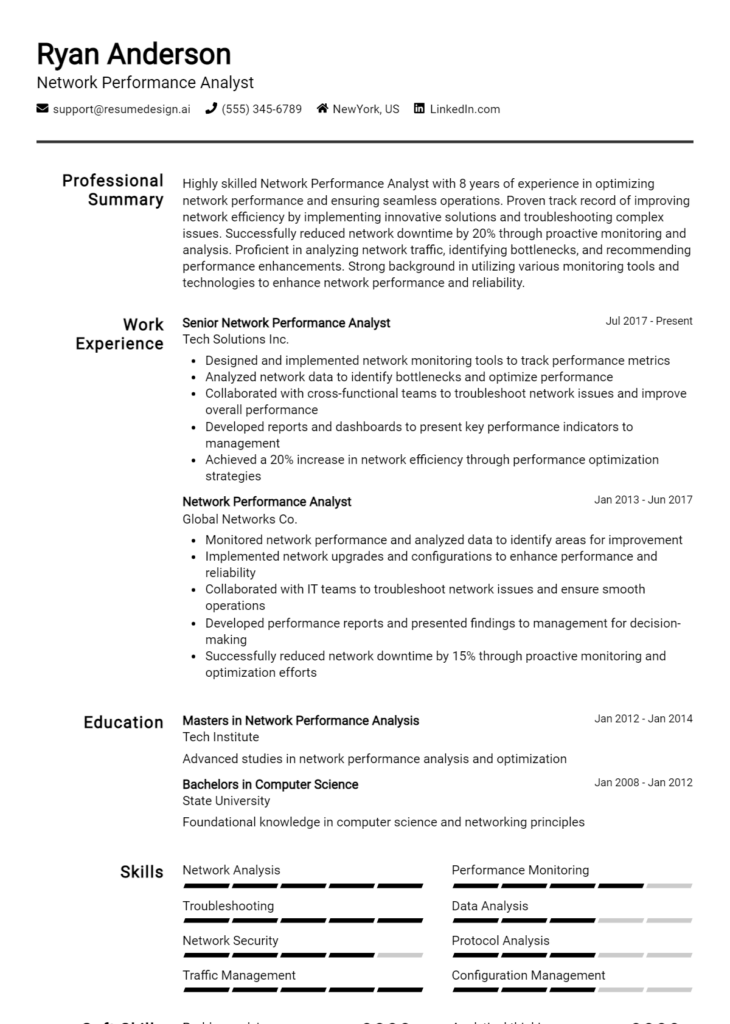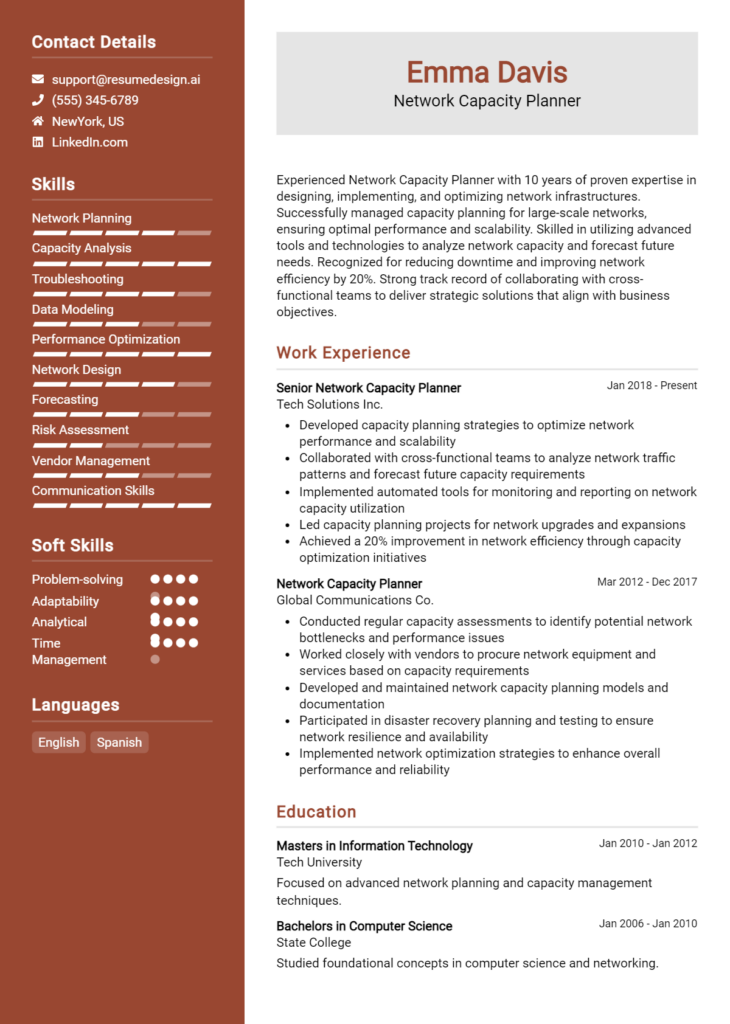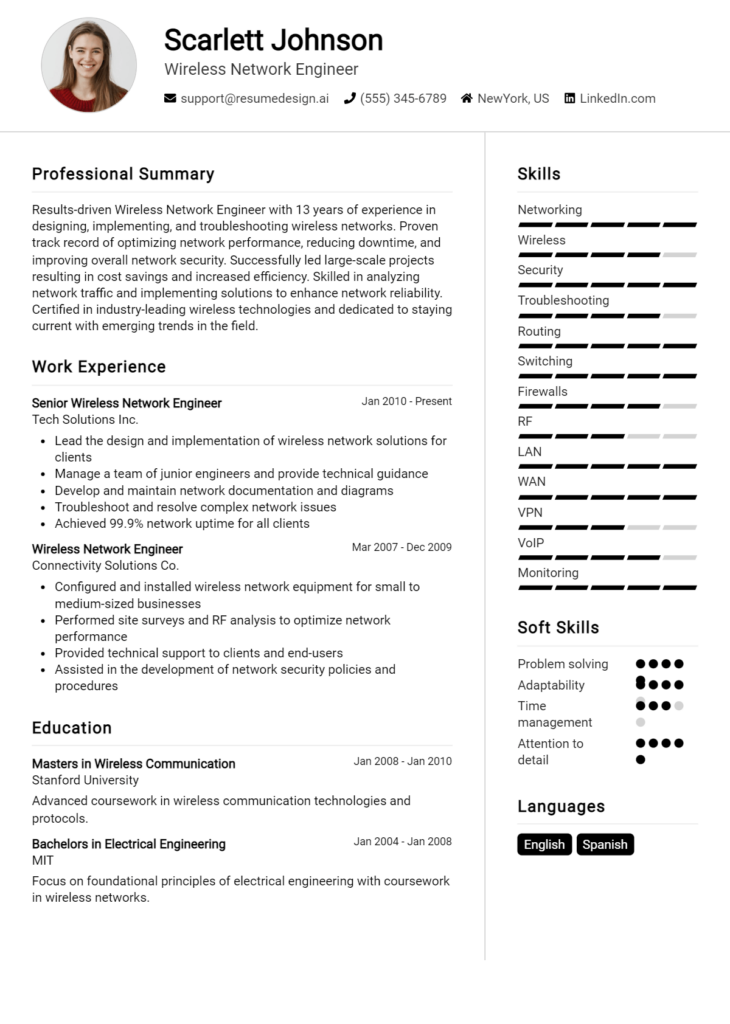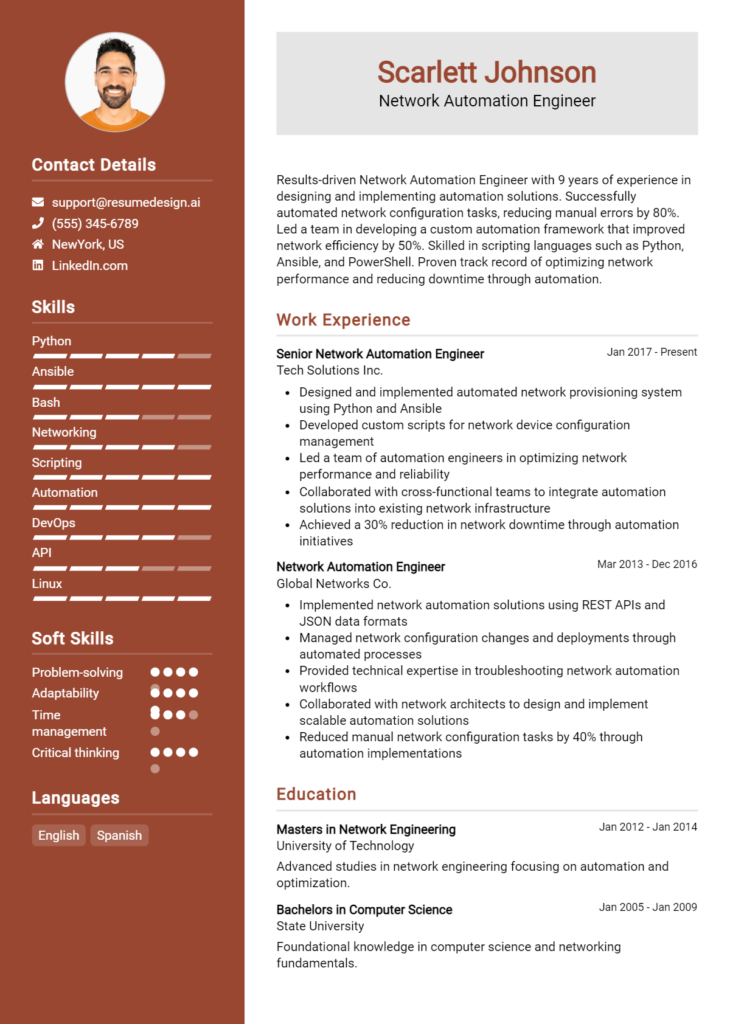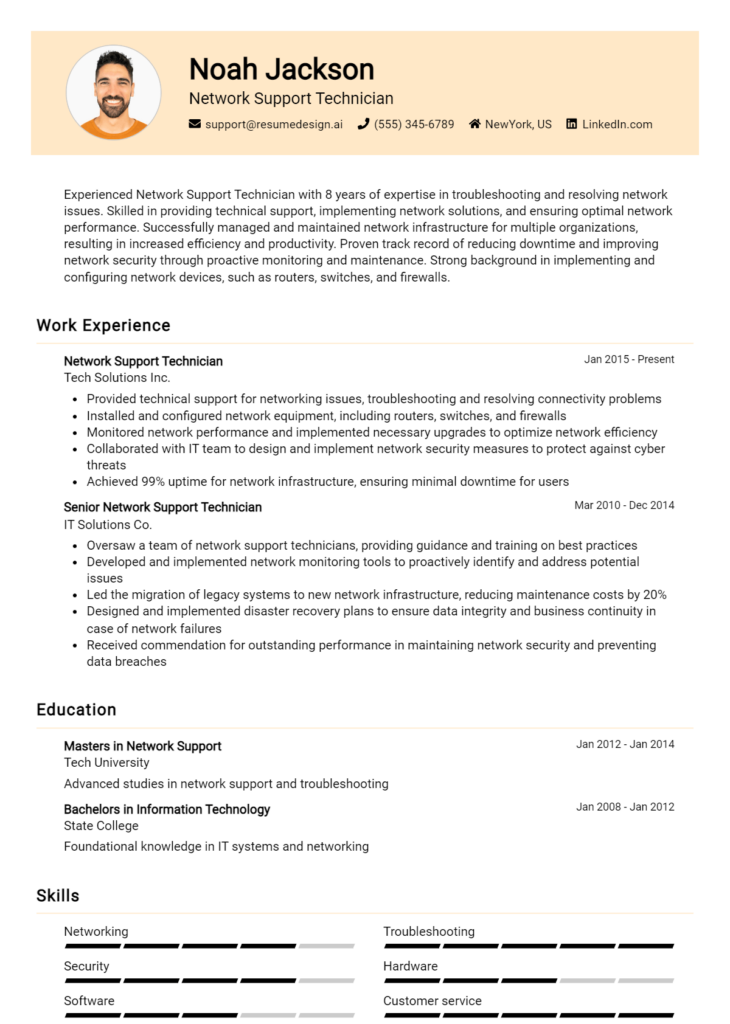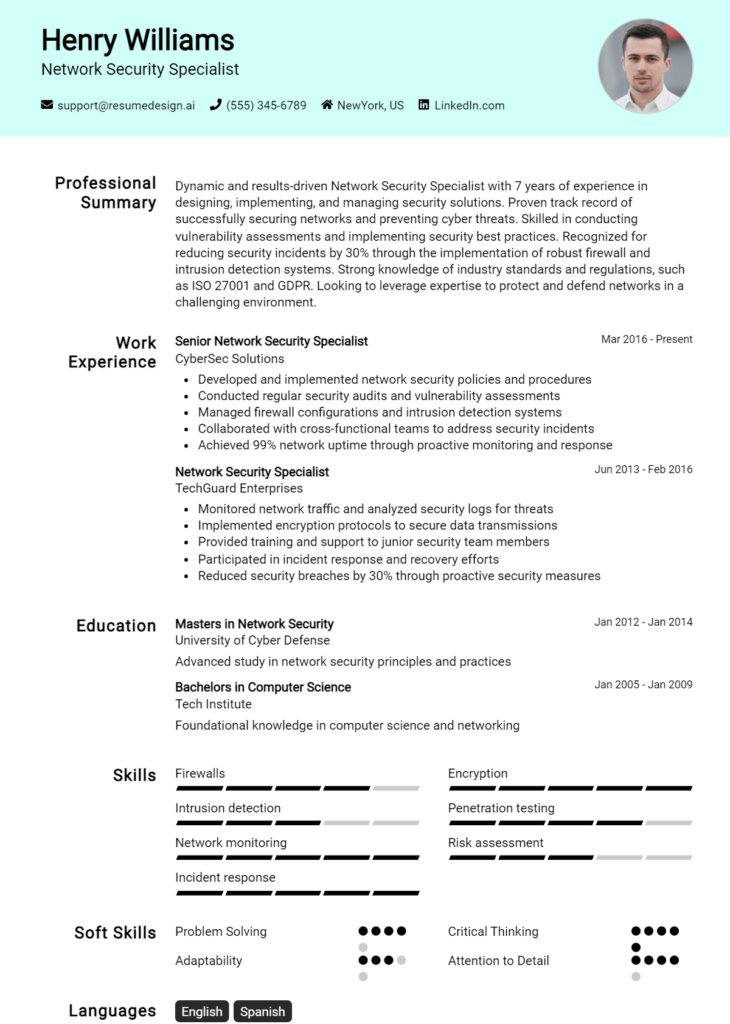Network Engineer Core Responsibilities
A Network Engineer is responsible for designing, implementing, and maintaining an organization's network infrastructure, ensuring seamless connectivity between various departments. This role requires strong technical skills in network protocols, routing, and security, alongside operational expertise to troubleshoot issues effectively. Problem-solving abilities are crucial for optimizing network performance and ensuring reliable communication across functions. By showcasing these competencies in a well-structured resume, candidates can demonstrate their value in achieving organizational goals and facilitating collaboration.
Common Responsibilities Listed on Network Engineer Resume
- Design and implement network architectures and topologies.
- Configure and maintain routers, switches, and firewalls.
- Monitor network performance and troubleshoot connectivity issues.
- Ensure network security through firewalls and encryption protocols.
- Conduct regular network assessments and audits.
- Collaborate with IT teams to support application deployments.
- Document network configurations and updates.
- Provide technical support and training to staff.
- Stay updated with emerging technologies and industry trends.
- Implement disaster recovery plans and backup strategies.
High-Level Resume Tips for Network Engineer Professionals
In the competitive field of network engineering, a well-crafted resume is crucial for making a strong first impression on potential employers. Your resume is often the first glimpse a hiring manager gets of your professional capabilities, so it must effectively reflect your technical skills, relevant experience, and notable achievements. A compelling resume not only showcases your qualifications but also tells your unique story as a network engineer, setting you apart from other candidates. This guide will provide practical and actionable resume tips specifically tailored for network engineering professionals, helping you to present your best self to prospective employers.
Top Resume Tips for Network Engineer Professionals
- Tailor your resume for each job application by closely aligning your skills and experience with the specific requirements outlined in the job description.
- Highlight relevant work experience, focusing on positions that involved network design, implementation, and troubleshooting.
- Quantify your achievements by including metrics that demonstrate the impact of your work, such as reduced downtime percentages or increased network efficiency.
- Showcase industry-specific skills, such as proficiency in network protocols (like TCP/IP, BGP, OSPF) and familiarity with network hardware (routers, switches, firewalls).
- Incorporate relevant certifications (such as CCNA, CCNP, or CompTIA Network+) prominently in your resume to validate your expertise and commitment to the field.
- Utilize action verbs to describe your responsibilities and accomplishments, making your contributions clear and impactful.
- Keep the layout clean and professional; use bullet points for easy readability and avoid cluttering the resume with excessive information.
- Include a summary statement that succinctly captures your core competencies and career goals, tailored to highlight your fit for the role you are applying for.
- Proofread carefully to eliminate any errors or inconsistencies; typos can undermine your professionalism and attention to detail.
- Consider including a section for relevant projects or case studies that demonstrate your problem-solving abilities and technical expertise in real-world scenarios.
By implementing these tips, you can significantly enhance your resume's effectiveness, increasing your chances of landing a job in the network engineering field. A focused and polished resume will not only showcase your qualifications but also convey your professional narrative, making you a compelling candidate for potential employers.
Why Resume Headlines & Titles are Important for Network Engineer
In the competitive field of network engineering, a well-crafted resume headline or title plays a crucial role in capturing the attention of hiring managers. A strong headline can serve as a powerful summary of a candidate's key qualifications, skills, and experiences, all encapsulated in one impactful phrase. This concise introduction not only highlights the applicant's suitability for the role but also sets the tone for the rest of the resume. A compelling headline should be relevant to the specific job being applied for, ensuring it resonates with the requirements outlined in the job description.
Best Practices for Crafting Resume Headlines for Network Engineer
- Keep it concise: Aim for a headline that is no longer than 10-12 words.
- Be specific: Use terminology and keywords relevant to network engineering.
- Highlight key skills: Focus on the most critical skills that match the job description.
- Incorporate metrics: If possible, include quantifiable achievements to add credibility.
- Use action words: Begin with strong verbs to convey dynamism and proactiveness.
- Tailor to the job: Customize the headline to reflect the specific role and company.
- Emphasize certifications: Mention any relevant certifications that enhance your qualifications.
- Avoid jargon: Ensure the language is accessible and understandable to all hiring managers.
Example Resume Headlines for Network Engineer
Strong Resume Headlines
"Certified Network Engineer with 5+ Years of Experience in Cisco Systems"
“Results-Driven Network Specialist with Proven Track Record in Network Optimization”
“Network Engineer Expert in Cloud Solutions and Cybersecurity Strategies”
“Dynamic Network Professional with a Focus on High-Availability Systems”
Weak Resume Headlines
“Network Engineer Seeking Opportunities”
“Experienced IT Professional”
The strong headlines are effective because they immediately convey specific skills, experiences, and achievements relevant to the network engineering field, making a compelling case for the candidate’s fit for the role. They utilize industry-specific terminology and metrics that resonate with hiring managers, demonstrating an understanding of the position's requirements. In contrast, the weak headlines fail to impress as they are vague and non-specific, lacking the detail and impact needed to capture attention in a crowded applicant pool. Without clear differentiation, these generic titles do not provide any meaningful insight into the candidate's qualifications.
Writing an Exceptional Network Engineer Resume Summary
A well-crafted resume summary is crucial for a Network Engineer as it serves as the first impression for hiring managers. It quickly encapsulates the candidate's key skills, experience, and accomplishments relevant to the role, allowing recruiters to assess their fit within seconds. An impactful summary should be concise and tailored to the specific job being applied for, highlighting the candidate's unique value proposition and making a strong case for why they should be considered for the position.
Best Practices for Writing a Network Engineer Resume Summary
- Quantify achievements: Use numbers and metrics to showcase your successes, such as improved network uptime or reduced latency.
- Focus on relevant skills: Highlight technical skills and certifications that are pertinent to the position.
- Tailor the summary: Customize your summary to align with the specific job description and company needs.
- Keep it concise: Aim for 2-4 sentences that deliver maximum impact without overwhelming the reader.
- Showcase problem-solving abilities: Mention your experience in troubleshooting and resolving network issues effectively.
- Include industry keywords: Use terminology that aligns with the job description to pass through Applicant Tracking Systems (ATS).
- Highlight teamwork and collaboration: Emphasize your experience working with cross-functional teams to achieve network goals.
- Reflect continuous learning: Mention any ongoing education or certifications to demonstrate your commitment to the field.
Example Network Engineer Resume Summaries
Strong Resume Summaries
Detail-oriented Network Engineer with over 7 years of experience in designing and implementing scalable network solutions. Achieved a 30% increase in network efficiency by optimizing routing protocols and reducing downtime by 15% through proactive monitoring.
Results-driven Network Engineer with expertise in cybersecurity and cloud networking. Successfully led a project that enhanced network security protocols, reducing potential breaches by 40% and improving compliance with industry regulations.
Dynamic Network Engineer skilled in both LAN and WAN technologies, with a proven track record of managing networks for organizations with over 500 users. Improved overall network performance by 25% through strategic upgrades and ongoing maintenance.
Weak Resume Summaries
Experienced Network Engineer looking for new opportunities in the industry.
Knowledgeable in networking and computer systems, seeking to apply skills in a challenging environment.
The strong resume summaries are considered effective because they provide specific achievements, quantify results, and directly relate to the skills and experiences desired in a Network Engineer. They demonstrate the candidate's ability to deliver tangible outcomes and clearly illustrate their value to potential employers. In contrast, the weak resume summaries lack specificity and measurable results, making them less compelling and memorable to hiring managers.
Work Experience Section for Network Engineer Resume
The work experience section of a Network Engineer resume is crucial in demonstrating the candidate's technical skills, leadership capabilities, and commitment to delivering high-quality network solutions. This section not only highlights the hands-on experience that the candidate possesses but also illustrates their ability to manage teams effectively and execute complex projects. By quantifying achievements and aligning past experiences with industry standards, candidates can provide compelling evidence of their qualifications and value to potential employers, enhancing their chances of securing an interview.
Best Practices for Network Engineer Work Experience
- Focus on technical expertise by detailing specific technologies and protocols used in previous roles.
- Quantify results whenever possible, such as reduced downtime percentages or increased network efficiency.
- Highlight leadership experience, including team management and mentoring roles.
- Showcase collaboration with cross-functional teams to emphasize teamwork and communication skills.
- Use action verbs to convey a proactive approach to problem-solving and project execution.
- Align experiences with industry standards and current trends to demonstrate relevance.
- Include certifications and training that complement work experiences, showcasing professional development.
- Tailor the work experience section to the job description, emphasizing the most relevant roles and skills.
Example Work Experiences for Network Engineer
Strong Experiences
- Led a team of 5 engineers in the successful implementation of a comprehensive network upgrade, resulting in a 30% reduction in latency and a 25% increase in throughput.
- Designed and deployed a secure VPN solution for remote employees, enhancing security measures and reducing unauthorized access incidents by 40%.
- Managed a multi-site network project that streamlined operations across 10 locations, achieving a 15% cost reduction in operational expenses.
- Collaborated with the IT security team to develop a robust firewall configuration that improved network security posture and reduced vulnerabilities by 50%.
Weak Experiences
- Worked on various networking projects with little detail on outcomes or specific contributions.
- Assisted in troubleshooting network issues without specifying the types of problems addressed or technologies used.
- Participated in team meetings to discuss network upgrades without highlighting any quantifiable results or personal impact.
- Helped maintain network equipment, but did not elaborate on the scope or effectiveness of the maintenance efforts.
The examples presented are considered strong because they articulate specific achievements and quantify results, showcasing the candidate's impact on their organization. They reflect the ability to lead and collaborate effectively, using concrete data to back up claims. In contrast, the weak experiences lack detail and measurable outcomes, failing to convey the candidate's true capabilities or contributions in their previous roles. This lack of specificity can leave potential employers with questions about the candidate's qualifications and impact.
Education and Certifications Section for Network Engineer Resume
The education and certifications section of a Network Engineer resume plays a critical role in establishing the candidate's qualifications and expertise in the field. This section not only highlights the academic background that has equipped the candidate with foundational knowledge but also emphasizes industry-relevant certifications that demonstrate a commitment to professional development and continuous learning. Including relevant coursework and specialized training can greatly enhance the candidate's credibility, showcasing their alignment with the technical requirements of the job role and their ability to adapt to the evolving landscape of networking technologies.
Best Practices for Network Engineer Education and Certifications
- Prioritize relevant degrees, such as a Bachelor's in Computer Science, Information Technology, or Network Engineering.
- Include industry-recognized certifications like CCNA, CCNP, or CompTIA Network+ to validate technical skills.
- List relevant coursework that directly relates to networking principles, protocols, and technologies.
- Highlight specialized training programs, workshops, or boot camps that enhance specific competencies.
- Ensure the certifications are current and reflect the latest industry standards and technologies.
- Provide details on any ongoing education, such as online courses or webinars, to show a commitment to continuous learning.
- Organize the section in reverse chronological order to emphasize the most recent qualifications first.
- Limit the section to the most relevant educational experiences to keep it concise and impactful.
Example Education and Certifications for Network Engineer
Strong Examples
- Bachelor of Science in Network Engineering, XYZ University, 2021
- Cisco Certified Network Professional (CCNP), 2023
- CompTIA Network+ Certification, 2022
- Coursework: Advanced Routing Protocols, Network Security, and Wireless Technologies
Weak Examples
- Associate Degree in General Studies, ABC College, 2015
- Certified Microsoft Office Specialist, 2019
- Coursework: Introduction to Psychology, History of Art
- Outdated Cisco Certified Network Associate (CCNA), expired 2018
The examples listed as strong are considered effective because they directly align with the skills and knowledge required for a Network Engineer role, showcasing relevant degrees and up-to-date certifications that reflect current industry standards. In contrast, the weak examples demonstrate a lack of focus on networking-specific education and credentials, which do not contribute to the candidate’s qualifications for the position. This distinction emphasizes the importance of maintaining relevance and currency in educational achievements to enhance job candidacy.
Top Skills & Keywords for Network Engineer Resume
In the ever-evolving field of network engineering, possessing the right skills is crucial for crafting a compelling resume that stands out to potential employers. A well-structured resume not only highlights technical expertise but also showcases interpersonal capabilities that are essential for collaboration and problem-solving in network environments. Employers look for a blend of hard and soft skills that enable candidates to manage complex networks effectively, troubleshoot issues on the fly, and communicate solutions clearly. By emphasizing these skills, candidates can demonstrate their value and readiness to tackle the challenges in the dynamic world of networking.
Top Hard & Soft Skills for Network Engineer
Hard Skills
- Network Configuration and Management
- Routing and Switching Protocols (e.g., OSPF, BGP)
- Firewall and Security Management
- TCP/IP and Network Protocols
- VPN and Remote Access Technologies
- Network Monitoring and Performance Tuning
- Wireless Networking (Wi-Fi standards)
- VoIP Technologies
- Network Troubleshooting Techniques
- Cloud Networking (AWS, Azure, Google Cloud)
- Scripting and Automation (e.g., Python, Bash)
- Hardware Knowledge (routers, switches, etc.)
- Data Center Management
- Virtualization Technologies (VMware, Hyper-V)
- Network Documentation and Design
- Cybersecurity Fundamentals
- Load Balancing and Failover Techniques
Soft Skills
- Problem-Solving and Critical Thinking
- Effective Communication Skills
- Team Collaboration and Leadership
- Time Management and Prioritization
- Adaptability and Flexibility
- Attention to Detail
- Customer Service Orientation
- Analytical Thinking
- Conflict Resolution
- Project Management Skills
- Interpersonal Skills
- Decision-Making Ability
- Creativity and Innovation
- Stress Management
- Negotiation Skills
- Continuous Learning Mindset
- Empathy and Emotional Intelligence
For further insights on how to enhance your resume with skills and effectively showcase your work experience, consider exploring additional resources and examples tailored for network engineering professionals.
Stand Out with a Winning Network Engineer Cover Letter
Dear [Hiring Manager's Name],
I am writing to express my interest in the Network Engineer position at [Company Name], as advertised on [where you found the job listing]. With a Bachelor’s degree in Computer Science and over [X years] of hands-on experience in designing, implementing, and maintaining complex network infrastructures, I am confident in my ability to contribute effectively to your team. My background in optimizing network performance and ensuring security protocols aligns well with the responsibilities outlined in the job description.
In my previous role at [Previous Company Name], I successfully managed a multi-site network that supported over [X] users. I led a project to upgrade our routing and switching systems, resulting in a 30% improvement in network efficiency and a significant reduction in downtime. Additionally, my expertise in configuring and troubleshooting hardware, as well as my knowledge of various networking protocols, has equipped me with the skills needed to handle diverse network environments. My commitment to staying current with industry trends allows me to implement innovative solutions that enhance overall network performance.
I am particularly drawn to this opportunity at [Company Name] because of your commitment to technological advancement and innovation. I am eager to bring my skills in network design and security to your organization and help drive the success of your IT initiatives. I am excited about the prospect of collaborating with a talented team to develop and maintain robust network solutions that support your business objectives.
Thank you for considering my application. I look forward to the opportunity to discuss how my experience and vision can contribute to the continued success of [Company Name]. I am available at your convenience for an interview and can be reached at [Your Phone Number] or [Your Email].
Sincerely,
[Your Name]
Common Mistakes to Avoid in a Network Engineer Resume
When crafting a resume for a Network Engineer position, it's crucial to present your skills and experience in a manner that captures the attention of hiring managers. However, many candidates fall into common pitfalls that can undermine their chances of landing an interview. Avoiding these mistakes can significantly enhance the effectiveness of your resume and help you stand out in a competitive job market.
Vague Job Descriptions: Failing to provide specific details about your previous roles can leave hiring managers unsure of your qualifications. Use clear, quantifiable achievements to demonstrate your impact.
Overloading with Technical Jargon: While technical skills are essential, using excessive jargon can alienate recruiters who may not have a technical background. Aim for a balance between technical language and clarity.
Ignoring Soft Skills: Network Engineers often need to work in teams and communicate with non-technical stakeholders. Neglecting to highlight interpersonal skills can give the impression that you lack teamwork abilities.
Lack of Tailoring: Sending out a generic resume for every application can be detrimental. Tailor your resume to match the specific job description, aligning your skills with the requirements of each position.
Inconsistent Formatting: A disorganized resume can be distracting and hard to read. Use a consistent format for headings, bullet points, and fonts to create a professional appearance.
Failure to Include Certifications: Given the importance of certifications in the tech field, omitting relevant credentials can be a missed opportunity. Make sure to list certifications like CCNA, CCNP, or CompTIA Network+ prominently.
Not Showcasing Relevant Experience: Some candidates may include unrelated job experience that doesn't contribute to their qualifications as a Network Engineer. Focus on your relevant experience and skills to keep the resume concise and targeted.
Omitting Metrics and Results: Simply listing duties without demonstrating the outcomes of your work can weaken your resume. Use metrics to illustrate your achievements, such as improved network uptime or reduced latency percentages.
Conclusion
As we conclude our exploration of the essential skills and responsibilities of a Network Engineer, it's crucial to highlight the importance of having a well-crafted resume that effectively showcases your expertise. Throughout this article, we discussed the key competencies required for a Network Engineer, including proficiency in network protocols, troubleshooting skills, and a solid understanding of network security measures. We also emphasized the significance of certifications and continuous learning in this rapidly evolving field.
Now is the perfect time to take a proactive step in your career by reviewing and updating your Network Engineer resume. With the right tools at your disposal, you can enhance your job application and stand out to potential employers. Consider utilizing our resume templates to create a professional layout that highlights your skills and experience. Explore our resume builder for an intuitive way to craft your resume from scratch or refine an existing one.
Additionally, if you're looking for inspiration, check out our resume examples to see how other successful Network Engineers present their qualifications. Don't forget the power of a compelling cover letter; our cover letter templates are designed to help you make a great first impression.
Take action today and ensure your resume reflects your capabilities as a Network Engineer—your next career opportunity awaits!

